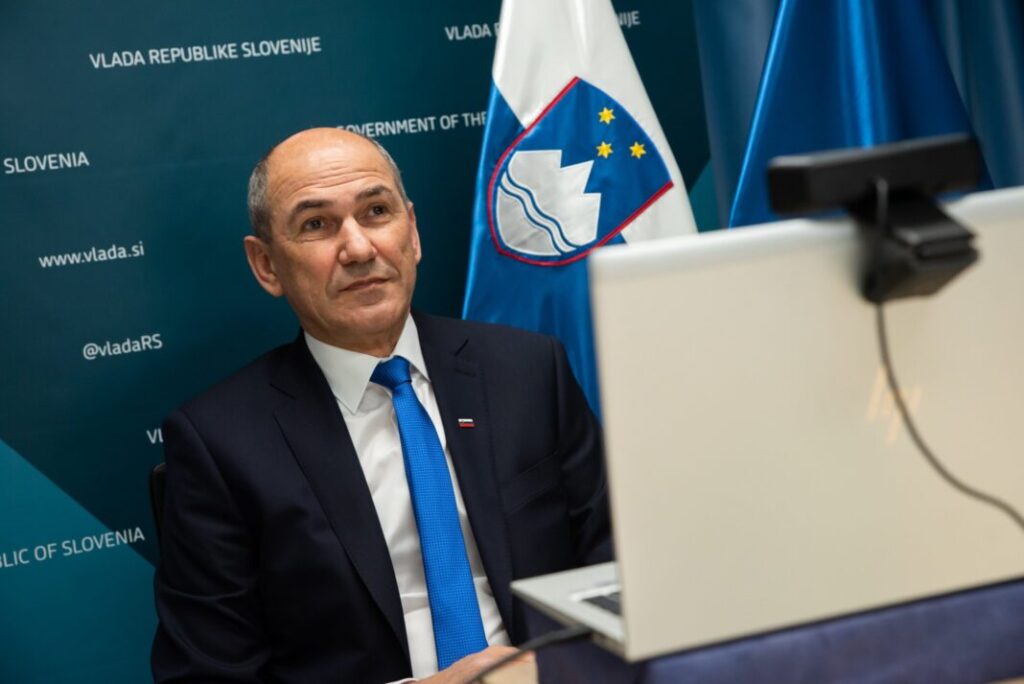The Prime Minister’s Office announced that Janez Janša was the speaker at a virtual conference entitled “Changing paradigms in a pandemic world: How to regain trust?” – Health, happiness, and ethics”. The virtual conference was held under the auspices of the World Forum for Ethics and Business.
The conference was also attended by Tedros Adhanom Ghebreyesus, Director-General of the World Health Organisation; Petra de Sutter, Deputy Prime Minister and Minister of Public Administration from Belgium; Kjell Magne Bondevik, former Norwegian Prime Minister; Jo Churchill, Minister of Public Health, Primary Health Care and Prevention from the UK; dr. Christian Garbe, General Manager at FIZ Biotech. In his introductory address, Prime Minister Janez Janša said that we often hear that hard times bring out the best and the worst in people. “The covid-19 pandemic is a great example of this. We have witnessed the selfless commitment of healthcare professionals around the world, as well as the increase in the black market for personal protective medical equipment, and in recent months also the increase in the black market for vaccines,” said the Prime Minister.
We can also see some similarities at the state level. “For example, EU Member States, although they do not have enough vaccine for their citizens, have exported almost 77 million doses to more than 30 countries. The European Union is also a leading donor to the COVAX programme, which has delivered 31 million doses of the vaccine to 54 countries. It would be very welcome and useful for the world community if the EU allies joined us in selfless actions and reciprocity,” the Prime Minister emphasised. “It is unwise to assume that when we are vaccinated in the West, we will be safe from this pandemic. If the rest of the world does not get the vaccine, the virus will mutate and reappear in the West. Until the whole world is vaccinated, we as a humanity will not defeat the virus,” Janša continued.
He reminded us that it took almost 200 years to eradicate smallpox. “However, I am optimistic that this will not be the case with covid-19 disease. In one year since the outbreak, scientists and pharmaceutical companies have produced vaccines that would normally take them about a decade to produce,” the Prime Minister said, adding that we have the knowledge and are building capacities to fight the virus. “We are also gaining experience for the next possible epidemics. And we have learned that the more solidarity we show to our fellow human beings, the sooner we will finally overcome this disease,” said the Prime Minister. According to the Prime Minister, the effectiveness of our fight against the pandemic will thus depend on the leadership of statesmen if they recognise and solve the moral dilemma regarding vaccines. “If they act selfishly, their countries may be better off in the short term, but worse off in the long run.”
“An even more important question on the horizon is whether as society and people we will be better or worse off after this pandemic.”
“But if we all act in solidarity; it will bring long-term benefits that will have short-term consequences. All leaders have a responsibility for their countries and for the people who elected them,” added the Prime Minister. He also said that there is no simple and unambiguous answer to this riddle or dilemma. “The current situation also illustrates Max Weber’s ethical dilemma about the relationship between the ethics of belief and the ethics of responsibility. Weber believes that political virtue lies in the conscious combination of the two in a united soul. Thus, the most prudent way forward is for state leaders, if I speak very practically, to strengthen the COVAX agreement and involve the whole world in the distribution mechanism, extend the partnership to private entities, and provide certain benefits to investors, manufacturers and vaccine developers,” said the Prime Minister, adding that without such an approach there would be no progress.
“As statesmen, we are not running away from our obligations and responsibilities, but the outcomes will be known only in the coming months,” said the Prime Minister, adding that he had been in contact with many volunteers and NGOs in the last year, so he knows that they are also contributing to the fight against the pandemic. Last but not least, the Slovenian Prime Minister said that it was only a matter of time before we would overcome the covid-19 pandemic. “An even more important question on the horizon is whether as society and people we will be better or worse off after this pandemic. The answer to this question is already emerging both now as we speak and in the real future. In fact, when it comes to interpersonal solidarity and global governance, every day of a pandemic counts. World leaders are the ones who need to show a moral compass. Maybe now more than ever before, because only in this way can we lead countries and societies into a better and brighter future,” Janša concluded his address. According to the organiser, the virtual conference was attended by over 2 million people from 100 countries.
Domen Mezeg


